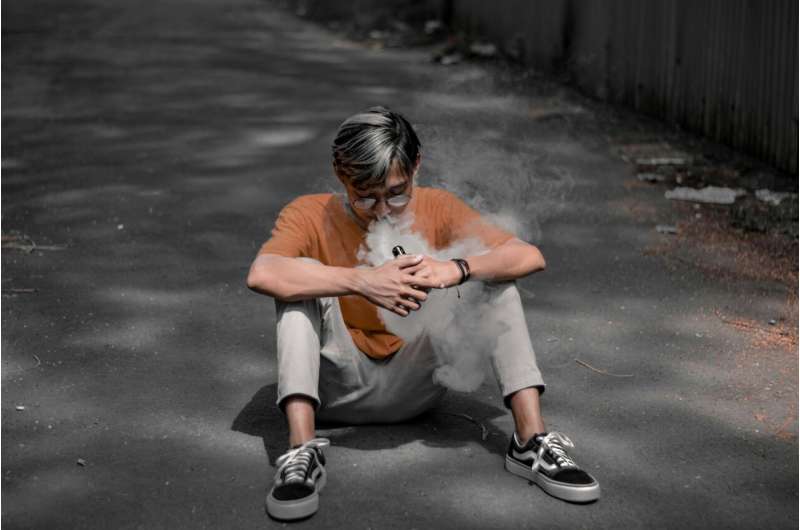This article has been reviewed according to Science X's editorial process and policies. Editors have highlighted the following attributes while ensuring the content's credibility:
fact-checked
trusted source
proofread
Vaping worsens sleep quality and the mental health of young people, suggests study

Vape use significantly impacts the sleep quality and anxiety levels of young adults, suggests a new study from the University of Surrey published in the journal Healthcare. Mindfulness was also found to help reduce the risk of young people taking up vaping.
Surrey researchers investigated the relationship between vaping, sleep quality and mental health of young adults aged 18–25 years. Researchers also investigated how vaping links to loneliness, and mindfulness (which can enhance emotional regulation). They also studied rumination, which involves repetitive thinking or dwelling on negative feelings.
Researchers found that the sleep quality of vape users was significantly lower than that of their non-vaping peers, with more than three-quarters displaying symptoms of insomnia. The stimulative properties of nicotine could cause this poor sleep; also, sleep deprivation could increase vape use as a way to compensate for lethargy during the day.
Dr. Simon Evans, Lecturer in Neuroscience at the University of Surrey, said, "It is now common to see a young person vaping. The emergence of vape shops makes these products more readily available and increases the temptation to purchase them. What is worrying is that many are unaware of or simply downplay the dangers of such products, believing that something that tastes 'fruity' could not be harmful.
"This is not the case as the nicotine contained in the products is known to negatively affect brain development and may induce behaviors that increase the risk of developing substance abuse issues."
Vape use among young people has risen drastically over the last decade and not enough is known about its effects. To learn more, researchers surveyed 316 participants (263 who did not vape vs. 49 who did) about their vaping habits, sleep quality and mental health. Importantly, anxiety levels were found to be heightened in the vape-user group, with 95.9% of users being categorized as having clinical levels of anxiety symptoms.
Researchers also found that 73.5% of those who vaped were evening types ("night owls") compared to only 40% of non-users. Vape users also reported higher levels of loneliness. This loneliness might be linked to their "night owl" tendencies, as previous studies have indicated that young adults who tend to stay up late at night often experience lower social support.
For the first time, researchers also examined levels of mindfulness and rumination. They found that vape users had significantly lower levels of mindfulness, and higher levels of rumination, than their non-user peers. This suggests that mindfulness training might help protect young people from taking up vaping. Conversely, those with higher levels of rumination could be vaping as a means to self-medicate against distress.
Dr. Evans added, "Vaping impacts all areas of physical and mental health. Poor sleep not only affects a young person's daily functioning but, over the longer term, increases the risk of developing heart disease and diabetes. In this study, we found a disturbing link between vape use and anxiety symptoms, and it can become a vicious cycle of using a vape to soothe anxiety but then being unable to sleep, making you feel worse in the long run.
"However, the data shows that interventions that focus on mindfulness and combating rumination could be useful to reduce vape use among young people."
More information: Simon L. Evans et al, Personality Risk Factors for Vape Use amongst Young Adults and Its Consequences for Sleep and Mental Health, Healthcare (2024). DOI: 10.3390/healthcare12040423



















